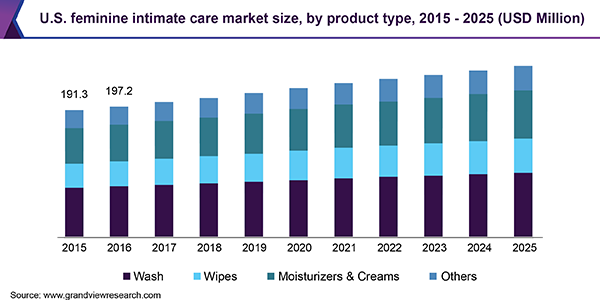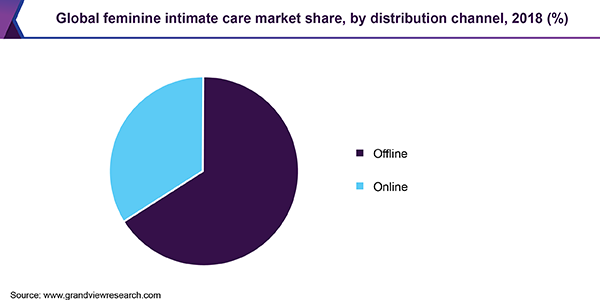- Home
- »
- Beauty & Personal Care
- »
-
Feminine Intimate Care Market Size, Global Industry Report, 2019-2025GVR Report cover
![Feminine Intimate Care Market Size, Share & Trends Report]()
Feminine Intimate Care Market Size, Share & Trends Analysis Report By Product Type (Wash, Wipes), By Distribution Channel (Offline, Online), By Region, And Segment Forecasts, 2019 - 2025
- Report ID: GVR-2-68038-979-1
- Number of Report Pages: 80
- Format: PDF, Horizon Databook
- Historical Range: 2015 - 2017
- Forecast Period: 2019 - 2025
- Industry: Consumer Goods
Report Overview
The global feminine intimate care market size was valued at USD 1.1 billion in 2018 and is expected to register a CAGR of 3.4% from 2019 to 2025. The growth of the market is attributed to increasing awareness among female consumers regarding genital hygiene. Rising inclination of women towards female hygiene products owing to increasing risk of health issues in the intimate area leading to various skin diseases has fueled the market growth.

In addition, rising awareness about the products offered by the manufacturers has influenced the female consumers to maintain their genital hygiene on a priority basis, which is contributing to the women intimate care market growth. Rise in usage of intimate wash products amongst the sportswomen and its publicity are encouraging women to trust the products. Increase in the number of working women has empowered them to spend more on personal hygiene.
Demand for intimate hygiene products is increasing due to rise in the average age of early puberty. According to the findings, the average age of puberty have been observed to be decreasing from 13 years earlier to 10 to 11 years. Unhealthy food habits, obesity, and stress are the main reasons responsible for early puberty in girls. Moreover, reproductive tract infections (RTIs) are becoming common amongst the adolescents as a result of poor genital hygiene. These factors are expected to drive the market.
Underdeveloped and developing countries such as Afghanistan, Cambodia, India, and China lack proper hygienic conditions and sanitation facilities. The government is taking initiatives to increase awareness among women regarding feminine hygiene products such as intimate wash in rural areas. Health and hygiene campaigns are also conducted in schools, workplaces, and universities in different parts of the world. For instance, the UNICEF organized the Global Interfaith WASH Alliance (GIWA) in India to influence the women to maintain hygiene and increase awareness related to topics such as menstruation.
Product Type Insights
The female intimate wash accounted for the largest share of 38.4% in 2018. According to the international guidelines, the daily gentle washing of vulva can minimize the risk of vulvovaginal disorders and improve the overall intimate health. According to a report by Chem Fatale, approximately 40% of American females use intimate wash to maintain hygiene. Therefore, increasing popularity of the product has been contributing to the feminine intimate care market growth.
Intimate wipes are expected to register the fastest CAGR of 3.9% over the forecast period. The wipes are gaining popularity among the females owing to the fact that they are a convenient product, which provides moist cleaning of the genital area. Change in lifestyle and increasing population of working women that lays stress on the convenience factor and handy products are the major factors accounting for the growth of this segment. According to recent studies, more than 10% to 15% of women residing in America use wipes out of which Latina women are the prime users of the wipes.
Distribution Channel Insights
In 2018, the offline distribution channel held the largest share of over 60.0%. The offline segment comprising hypermarket, supermarket, drugstore and other outlets is preferred by the consumers. Factors such as wide variety of products to choose, advantage of scanning the products and determining its benefits, and usage before buying are responsible for the popularity of the offline channel. Moreover, advertisement strategy is used in the retail shops in order to influence consumers, which results in impulse buying of the product.

The online segment is anticipated to register the highest CAGR of 3.6% over the forecast period. Rise in penetration of e-commerce and smart devices like mobile phones and tablets, along with benefits like easy payment options and discounts, are the factors contributing to the growth of this market. Changing lifestyle of consumers is enabling them to shop from anywhere and anytime. Moreover, low cost associated with online start-ups is boosting the growth of this segment. For instance, Nykaa is an India’s online shopping beauty store that initially started with providing cosmetics and personal care products online and has now opened up a few physical stores in urban cities.
Regional Insights
North America held the largest share of 31.4% in 2018. Easy availability of intimate care products owing to increased popularity and high spending in the region are the major factors contributing to the regional market growth. Increasing awareness among women regarding the harmful effects of unclean intimate area such as skin diseases, itching, odor, and potential of cervical cancer are the main factors driving the product demand in the region. The feminine care market is driven by the usage of intimate care products by the Latina and African-American women as compared to the white women.
Asia Pacific is expected to be the fastest growing region with a CAGR of 4.1% from 2019 to 2025. Increase in spending power of young consumers and rise in awareness about intimate hygiene, along with rise in disposable income in the developing countries such as India and China, are accelerating the growth of the market in Asia Pacific. The region accounts for a major share in the personal care market, which is encouraging the manufacturers to invest in the region to expand their business.
Key Companies & Market Share Insights
The industry is dominated by leading players such as Sanofi; Bayer Group; Namyaa Skincare; C.B. Fleet Company, Inc.; CTS Group; Wet & Dry Personal Care (P) Ltd.; Combe Incorporated; SweetSpot Labs; Sliquid, LLC.; and Honey pot. Companies operating in this market primarily depend on product launches to gain a competitive advantage. For instance, Mylan Pharmaceuticals Ltd. had launched a daily use hygiene product named SAUGELLA Dermoliquido. This product aims at preventing infection during menstruation and is suitable for new and expecting mothers and women athletes.
Feminine Intimate Care Market Report Scope
Report Attribute
Details
Market size value in 2020
USD 1.24 billion
Revenue forecast in 2025
USD 1.45 billion
Growth Rate
CAGR of 3.4% from 2019 to 2025
Base year for estimation
2018
Historical data
2015 - 2017
Forecast period
2019 - 2025
Quantitative units
Revenue in USD million/billion and CAGR from 2019 to 2025
Report coverage
Revenue forecast, company ranking, competitive landscape, growth factors, and trends
Segments covered
Product type, distribution channel, region
Regional scope
North America; Europe; Asia Pacific; Central & South America; Middle East & Africa
Country scope
U.S.; U.K.; Germany; China; India; Brazil; South Africa
Key companies profiled
Sanofi; Bayer Group; Namyaa Skincare; C.B. Fleet Company, Inc.; CTS Group; Wet & Dry Personal Care (P) Ltd.; Combe Incorporated; SweetSpot Labs; Sliquid, LLC.; Honey Pot
Customization scope
Free report customization (equivalent up to 8 analysts working days) with purchase. Addition or alteration to country; regional & segment scope.
Pricing and purchase options
Avail customized purchase options to meet your exact research needs. Explore purchase options
Segments Covered in the ReportThis report forecasts revenue growth at the global, regional, and country levels and provides an analysis of the latest industry trends in each of the sub-segments from 2015 to 2025. For the purpose of this study, Grand View Research has segmented the global feminine intimate care market report on the basis of product type, distribution channel, and region:
-
Product Type Outlook (Revenue, USD Million, 2015 - 2025)
-
Wash
-
Wipes
-
Moisturizers & Creams
-
Others
-
-
Distribution Channel Outlook (Revenue, USD Million, 2015 - 2025)
-
Online
-
Offline
-
-
Regional Outlook (Revenue, USD Million, 2015 - 2025)
-
North America
-
U.S.
-
-
Europe
-
Germany
-
U.K.
-
-
Asia Pacific
-
India
-
China
-
-
Central & South America
-
Brazil
-
-
Middle East & Africa
-
South Africa
-
-
Frequently Asked Questions About This Report
b. The global feminine intimate care market size was estimated at USD 1.19 billion in 2019 and is expected to reach USD 1.24 billion in 2020.
b. The global feminine intimate care market is expected to grow at a compound annual growth rate of 3.4% from 2019 to 2025 to reach USD 1.45 billion by 2025.
b. North America dominated the feminine intimate care market with a share of 31.9% in 2019. This is attributable to easy availability of intimate care products due to increased popularity and high consumer spending capacity in the region.
b. Some key players operating in the feminine intimate care market include Sanofi; Bayer Group; Namyaa Skincare; C.B. Fleet Company, Inc.; CTS Group; Wet & Dry Personal Care (P) Ltd.; Combe Incorporated; SweetSpot Labs; Sliquid, LLC.; and Honey Pot.
b. Key factors that are driving the market growth include increasing awareness among female consumers regarding genital hygiene.
Share this report with your colleague or friend.
![gvr icn]()
NEED A CUSTOM REPORT?
We can customize every report - free of charge - including purchasing stand-alone sections or country-level reports, as well as offer affordable discounts for start-ups & universities. Contact us now
![Certified Icon]()
We are GDPR and CCPA compliant! Your transaction & personal information is safe and secure. For more details, please read our privacy policy.
We are committed towards customer satisfaction, and quality service.
"The quality of research they have done for us has been excellent."





